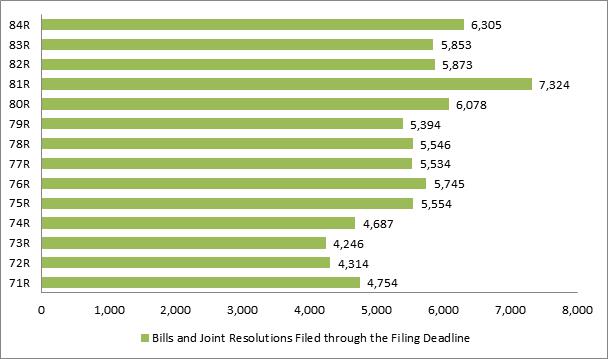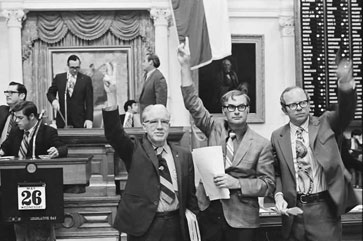|
House and Senate Bills
|
| Filed |
5,868 |
| Sent to the Governor |
1,437 |
| Signed by the Governor |
1,395 |
| Signed by the Governor/line item veto |
2 |
| Vetoed by the Governor |
26 |
| Filed without the Governor's signature |
14 |
| Sent to the Comptroller |
5 |
| Joint Resolutions |
| Filed |
193 |
| Filed with the Secretary of State |
10 |
| Concurrent Resolutions |
| Filed |
256 |
| Sent to the Governor |
176 |
| Signed by the Governor |
176 |
Bill statistics:
Midnight, June 16 was the last day the governor could sign, veto, or allow to become law without his signature bills passed during the 83rd Regular Session. When the deadline had passed, the governor had vetoed 26 bills (not including the line-item vetoes on SB 1, the General Appropriations Act, and HB 1025, a supplemental appropriations bill), signed 1,573 bills and concurrent resolutions and filed 14 bills without his signature. Joint resolutions that passed both chambers of the Legislature were filed with the Secretary of State, and will be on the ballot for the November 5, 2013, general election.
Vetoed bills:
Texas Constitution, Article IV, Section 14 states that if the governor vetoes a bill after the session has adjourned, he or she is required to give notice in the form of a proclamation. The library has compiled veto proclamations issued by Governor Perry for the 83rd Regular Session and made them available here.
Effective dates:
The library reviews the text of all bills that become law to determine their effective dates, and enters the information into the Texas Legislature Online. To find the effective date of a bill, check the "Last action" field on the bill's main page. In some cases, different sections of a bill may have different effective dates, in which case additional remarks will be given to provide the information.
In addition to updating the Texas Legislature Online with effective date information, the library compiles a list of bills and their effective dates following each regular and called session. The list is made available on the library's website once it is complete.
Signed copies of bills:
Bills that the Governor signed or allowed to become law without his signature are sent to the Secretary of State’s office, where they are made available online on the Bills and Resolutions page.
You can determine whether a bill sent to the Governor was signed or filed without signature by checking the bill in the Texas Legislature Online. If the bill passed but was filed without signature, you will see the action "Filed without the Governor's signature."
Session law chapter numbers:
The Secretary of State’s Bills and Resolutions page also lists the session law chapter number that is assigned to each bill that has become law. The session laws contain the text of all bills passed into law during a particular legislative session. Chapter numbers are used primarily for citing a bill in a legislative history annotation.
This entry was posted on June 26, 2013 at 8:03 AM and has received 1969 views.
Print this entry.







